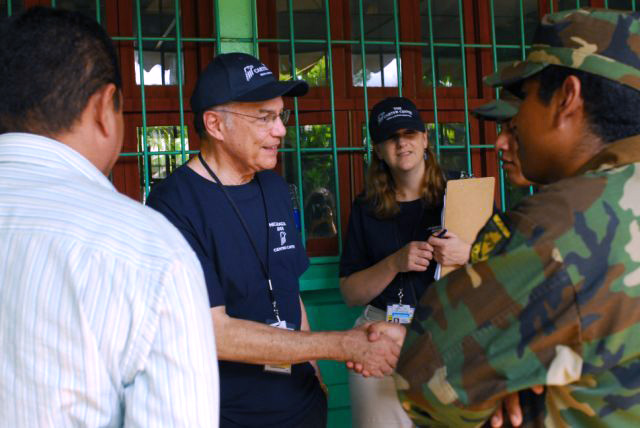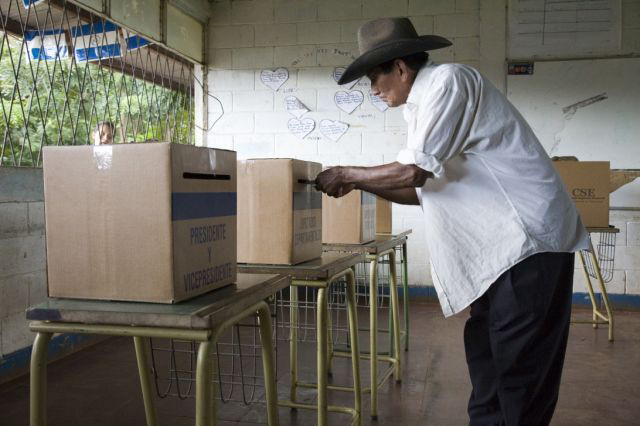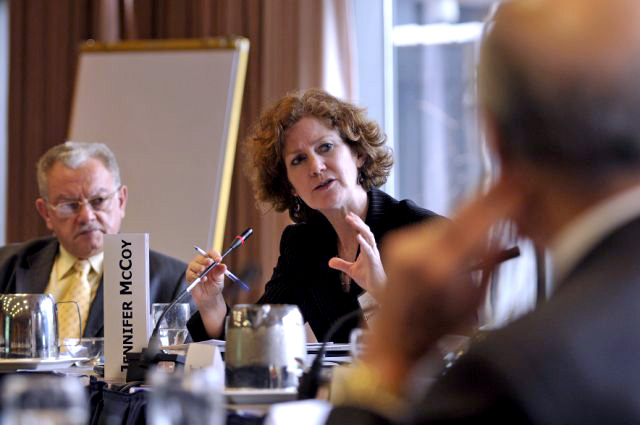A group of former leaders and human rights experts serve as a watchdog to threats against democratic stability in the Americas and as a voice to strengthen, promote, and protect democracy and human rights. The group aims to bolster the effectiveness of the Inter-American Democratic Charter, approved on Sept. 11, 2001, by all 34 members of the OAS to address new kinds of democratic threats beyond the traditional military coup.
Friends have conducted key missions to Nicaragua, Paraguay, Ecuador, Venezuela, Costa Rica, El Salvador, and Honduras.
As the tenth anniversary of this important document is celebrated, the Friends of the Inter-American Democratic Charter will meet at The Carter Center, which serves as secretariat for the group, to discuss potential new areas for involvement and ways to strengthen the Charter’s implementation.

Photo credit: Carter Center/D. Hakes
The Carter Center observed Nicaragua’s November 2006 elections. Friends of the Inter-American Democratic Charter member and former Panama President Nicolás Ardito Barletta (above), who served as co-leader of the observation mission, talks with voters at a polling station.
“The Charter is one of the most advanced regional democracy commitments in the world,” said Marcelo Varela, associate director of the Carter Center’s Americas Program. “It makes democracy a human right of citizens and provides an instrument for the collective promotion and defense of democracy. Some say the Charter lacks teeth because it isn’t a treaty; it’s not enforceable. But that is actually its strength – its moral value. It was a sign of goodwill on the part of governments when it was created 10 years ago.”
Members of the general public can learn more by attending Conversations at The Carter Center on Oct. 13, from 7-8:30 p.m. (EDT) at the Center, when several members of the Friends of the Democratic Charter will discuss the state of democracy in the Americas and the Charter’s reach. The panel will feature the Right Honourable Joe Clark, former prime minister of Canada; Eduardo Stein, former vice president of Guatemala; and Mariclaire Acosta, former undersecretary of foreign relations for human rights and democracy of Mexico. Moderated by Jennifer McCoy.
The Friends’ quiet diplomacy led to a Friend being named special representative of the OAS, a mediated resolution to the Nicaragua crisis, and subsequent observation of the elections.
Formed in 2004, the Friends have conducted assessment missions to Nicaragua, Paraguay, Ecuador, Venezuela, Costa Rica, El Salvador, and Honduras. They have provided private assessments to the OAS secretary general and other hemispheric officials, recommendations to the OAS General Assembly, and public statements to raise awareness about specific events affecting democracy and human rights in the hemisphere.
The first mission of the Friends was to Nicaragua in 2005 when the legislature threatened to impeach the president in a political dispute. The Friends’ quiet diplomacy led to a Friend being named special representative of the OAS, a mediated resolution to the Nicaragua crisis, and subsequent observation of the elections.

Photo credit: Carter Center/D. Evans
The first mission of the Friends was to Nicaragua in 2005, when the legislature threatened to impeach the president in a political dispute.
In 2009, the Friends sent a delegation to Honduras after the military forced then-President Zelaya into exile. They urged a political solution before the national elections and recommended to The Carter Center not to observe the elections without such an agreement. Efforts by the Friends also contributed to a balanced resolution, with the General Assembly of the OAS calling for the immediate and unconditional reinstatement of President Zelaya to comply with his constitutional obligations.

Photo credit: Carter Center/D. Hakes
Carter Center Americas Program Director Jennifer McCoy speaks during a March 2010 meeting of the Friends of the Inter-American Democratic Charter in Atlanta.
“After Honduras, the entire hemisphere united for the first time to soundly reject the idea that the military could remove an elected official by force no matter what the offence,” said Jennifer McCoy. “The challenge now is for the hemisphere to learn to use the Democratic Charter to also defend democratic principles when they are threatened by nonmilitary actors, whether that is a president abusing power, a court or legislature threatening a president, or social actors inciting violence or unconstitutional acts. The Carter Center hopes to continue to strengthen the Charter through the Friends as we face the challenges ahead.”
Please sign up below for important news about the work of The Carter Center and special event invitations.